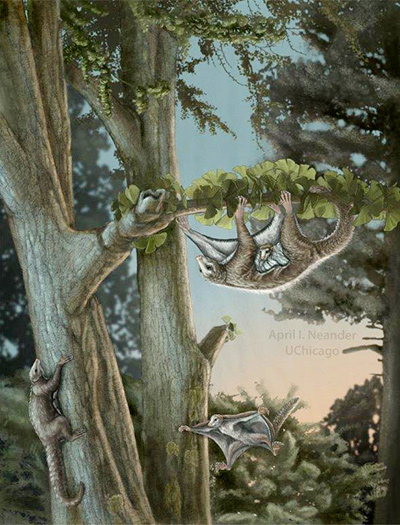Dinosaurs, flying mammals coexisted in China
(China Daily) Updated: 2017-08-11 08:21PARIS - In dense Chinese forests populated by dinosaurs 160 million years ago, two furry critters resembling flying squirrels glided from tree to tree, showing that even in such a perilous neighborhood early mammals had succeeded in going airborne.
Scientists announced on Wednesday the discovery of fossils of two Jurassic Period gliding mammals so well-preserved and complete that they show the winglike skin membranes the creatures employed while gliding effortlessly between trees.
The two species, Maiopatagium furculiferum from Liaoning province and Vilevolodon diplomylos unearthed about 60 kilometers away in Hebei province, come from an extinct early mammalian side branch. One of the critters was about 23 centimeters from head to tail, and the other 8 cm without its tail, which was missing.
These two and another apparent glider from about the same time that was described in 2006 were the vanguard of the mammalian air force. It was not until more than 100 million years later that bats, which use powered flight like birds, and more gliding mammals appeared, following the dinosaurs' demise.
Mammals first appeared roughly 210 million years ago. These fossils underscore that early mammals were not merely cowering at the feet of dinosaurs but boasted a range of body plans and lifestyles. They included beaver-tailed swimmers, tree climbers, hoppers, borrowers and small carnivores that ate baby dinosaurs.
"Despite living in dinosaur-dominated ecosystems, early mammals diversified into many ecological niches," said University of Chicago paleontologist Luo Zhexi, who led the research published in the journal Nature.
Reuters - Afp
 |
|
Ancient mammals that evolved to glide and live in trees are shown in an artist's rendition. APRIL I. NEANDER/UNIVERSITY OF CHICAGO/AFP |
- 'Cooperation is complementary'
- Worldwide manhunt nets 50th fugitive
- China-Japan meet seeks cooperation
- Agency ensuring natural gas supply
- Global manhunt sees China catch its 50th fugitive
- Call for 'Red Boat Spirit' a noble goal, official says
- China 'open to world' of foreign talent
- Free trade studies agreed on as Li meets with Canadian PM Trudeau
- Emojis on austerity rules from top anti-graft authority go viral
- Xi: All aboard internet express











